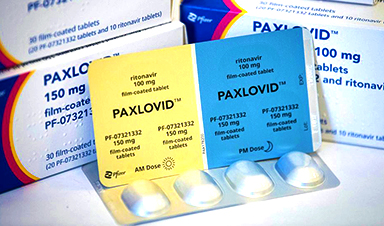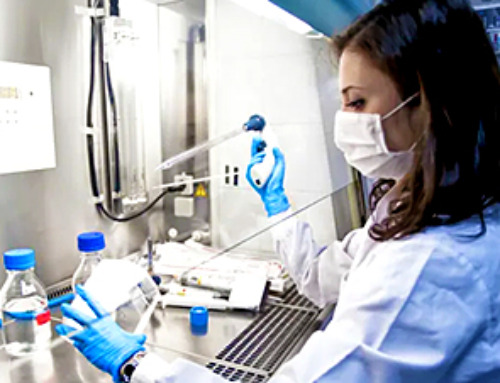U.S. Centers for Disease Control and Prevention Director Rochelle Walensky has experienced a COVID rebound after a course of Paxlovid, the federal health agency announced Monday morning.
She is isolating at home and will participate in meetings virtually, the agency added.
Walensky joins a short list of prominent U.S. pandemic figures, including President Joe Biden and presidential physician Dr. Anthony Fauci, who’ve tested negative, then positive again after taking the popular drug, prescribed for those with documented COVID who are at high risk for severe disease.
Just how rare are rebounds?
Paxlovid, approved for use by the U.S. Food and Drug Administration under an emergency use authorization, has become known for its “rebound cases,” referred to by the CDC as a “brief return of symptoms.”
Such rebounds, however, can happen with or without Paxlovid, Andy Pekosz, virologist at the Johns Hopkins Bloomberg School of Public Health, recently told Fortune.
While the U.S. Centers for Disease Control and Prevention says that COVID rebounds are rare, they could be more common than we know, as most individuals with COVID stop testing after they receive a negative result, he added.
“After I finished the five days of Paxlovid, I reverted to negative on an antigen test for three days in a row,” Fauci, 81, said during an event at Foreign Policy’s Global Health Forum, Bloomberg reported. “And then on the fourth day, just to be absolutely certain, I tested myself again.”
“I reverted back to positive.”
Fauci began a second course of Paxlovid when symptoms emerged “much worse than the first go-around,” he said. In May the CDC issued a health advisory about such rebounds, saying there was no evidence that additional treatment is needed for rebound cases.
In June, Pfizer, which manufactures Paxlovid, announced that it would stop adding new participants to a trial of the drug among COVID patients at low risk of hospitalization and death. The study failed to demonstrate that the drug reduced symptoms, or hospitalizations and deaths, in a statistically significant way, according to Bloomberg.
But Paxlovid may be undeservedly gaining a bad rap, Pekosz cautioned.
“I’ll still point to the fact that it’s working in terms of keeping people out of the hospital—that’s the most important thing right now,” he said, adding that it may need to be retooled to better address Omicron subvariants.
Image Credit: Pfizer
News
Lab-grown corticospinal neurons offer new models for ALS and spinal injuries
Researchers have developed a way to grow a highly specialized subset of brain nerve cells that are involved in motor neuron disease and damaged in spinal injuries. Their study, published today in eLife as the final [...]
Urgent warning over deadly ‘brain swelling’ virus amid fears it could spread globally
Airports across Asia have been put on high alert after India confirmed two cases of the deadly Nipah virus in the state of West Bengal over the past month. Thailand, Nepal and Vietnam are among the [...]
This Vaccine Stops Bird Flu Before It Reaches the Lungs
A new nasal spray vaccine could stop bird flu at the door — blocking infection, reducing spread, and helping head off the next pandemic. Since first appearing in the United States in 2014, H5N1 [...]
These two viruses may become the next public health threats, scientists say
Two emerging pathogens with animal origins—influenza D virus and canine coronavirus—have so far been quietly flying under the radar, but researchers warn conditions are ripe for the viruses to spread more widely among humans. [...]
COVID-19 viral fragments shown to target and kill specific immune cells
COVID-19 viral fragments shown to target and kill specific immune cells in UCLA-led study Clues about extreme cases and omicron’s effects come from a cross-disciplinary international research team New research shows that after the [...]
Smaller Than a Grain of Salt: Engineers Create the World’s Tiniest Wireless Brain Implant
A salt-grain-sized neural implant can record and transmit brain activity wirelessly for extended periods. Researchers at Cornell University, working with collaborators, have created an extremely small neural implant that can sit on a grain of [...]
Scientists Develop a New Way To See Inside the Human Body Using 3D Color Imaging
A newly developed imaging method blends ultrasound and photoacoustics to capture both tissue structure and blood-vessel function in 3D. By blending two powerful imaging methods, researchers from Caltech and USC have developed a new way to [...]
Brain waves could help paralyzed patients move again
People with spinal cord injuries often lose the ability to move their arms or legs. In many cases, the nerves in the limbs remain healthy, and the brain continues to function normally. The loss of [...]
Scientists Discover a New “Cleanup Hub” Inside the Human Brain
A newly identified lymphatic drainage pathway along the middle meningeal artery reveals how the human brain clears waste. How does the brain clear away waste? This task is handled by the brain’s lymphatic drainage [...]
New Drug Slashes Dangerous Blood Fats by Nearly 40% in First Human Trial
Scientists have found a way to fine-tune a central fat-control pathway in the liver, reducing harmful blood triglycerides while preserving beneficial cholesterol functions. When we eat, the body turns surplus calories into molecules called [...]
A Simple Brain Scan May Help Restore Movement After Paralysis
A brain cap and smart algorithms may one day help paralyzed patients turn thought into movement—no surgery required. People with spinal cord injuries often experience partial or complete loss of movement in their arms [...]
Plant Discovery Could Transform How Medicines Are Made
Scientists have uncovered an unexpected way plants make powerful chemicals, revealing hidden biological connections that could transform how medicines are discovered and produced. Plants produce protective chemicals called alkaloids as part of their natural [...]
Scientists Develop IV Therapy That Repairs the Brain After Stroke
New nanomaterial passes the blood-brain barrier to reduce damaging inflammation after the most common form of stroke. When someone experiences a stroke, doctors must quickly restore blood flow to the brain to prevent death. [...]
Analyzing Darwin’s specimens without opening 200-year-old jars
Scientists have successfully analyzed Charles Darwin's original specimens from his HMS Beagle voyage (1831 to 1836) to the Galapagos Islands. Remarkably, the specimens have been analyzed without opening their 200-year-old preservation jars. Examining 46 [...]
Scientists discover natural ‘brake’ that could stop harmful inflammation
Researchers at University College London (UCL) have uncovered a key mechanism that helps the body switch off inflammation—a breakthrough that could lead to new treatments for chronic diseases affecting millions worldwide. Inflammation is the [...]
A Forgotten Molecule Could Revive Failing Antifungal Drugs and Save Millions of Lives
Scientists have uncovered a way to make existing antifungal drugs work again against deadly, drug-resistant fungi. Fungal infections claim millions of lives worldwide each year, and current medical treatments are failing to keep pace. [...]





















